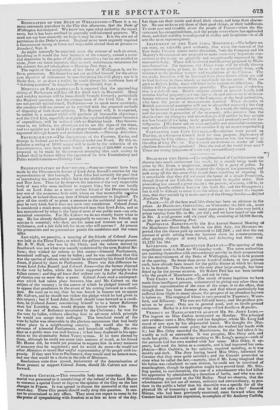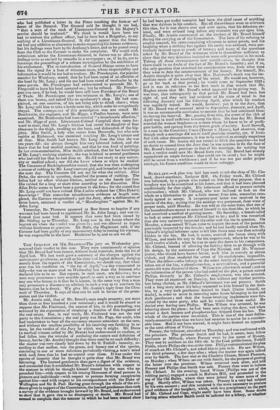Dts_tamixo THE Iassit.—The neighbonr1Lood of Carrickmacross was thrown into much
excitement lass week, by a search being made for arms by Mr. Evatt, a magistrate, attended by a party of police. In the course of their march, they entered the shops of the gunsmiths, and took away all the fire-arms they found there repairing or cleaning. It is remarkable that they did not enter the house of a single Protestant, though those of the Catholics they ransacked in regular order. This proceeding has caused a great outcry ; the pretext, of course, will be, to prevent a hostile collisien between the Cath.dies and the Orangemen ; but it will be difficult to erase from the minds of the former tho impres- sion, that they are left by it to the mercy of the Orange bandits.—Be/fast Northern Whig. TRADE.—At all the late wool fairs there has been an advance in the prices. At Dorchester, Oxfordshire, on Wednesday the 10th ult., more business was transacted than for many years past ; the sales very brisk ; prices varying from 22s. to 30s. per tad; and we have heard of one sale at 31s. A wool-grower sold six years' clip, consisting of 12,000 fleeces, at 28s. per tod.—/tforning Post. • PRovisretaL BANKING.—At the first Annual General Meeting the Manchester Share Bank, held on the 28th July, the Directors re- ported that the shares paid up amounted to 187,7G01.; and that the net amount of profit arising from the business since its commencement, after paying charges of every kind, and deducting bad. debte, was 11,1751. 15s. 10d. LIVERPOOL AND MANCHF.STER RAILWAY.—The opening of this magnificent work is fixed for Wednesday week. The town authorities are exerting themselves with extraordinary activity in their preparations for the entertainment of the Duke of Wellington, who is to be present . at the opening. No fewer than seven hundred tickets, at two guineas each, have already been issued for the public dinner at which his Grace is to be feasted. The theatre, as the only place large enough, has been fitted up for the joyous occasion. Sir Robert Peel has not been invited why the people of Manchester ask, and ask in vain. THE CROPS IN InEtasen.—The result of many inquiries we have made from intelligent persons, uninterested in giving any other than an impartial representation of the state of the crops, is to the effect, that though there has been damage done, and that wheat particularly has suffered from blight in many places, the prospect of an abundant harvest is before us. The reaping of wheat is very general in Tipperary, Water. ford, and Kilkenny. The ears are full and heavy, and the produce pro- mises to be great. Oats are in general good, and on fertile ground exuberant. Barley is a fair average crop.—Cork Southern Reporter.
VERDICT OF MANSLAUGHTER AGAINST Mn. ST. JOHN LONG.— The inquest on Miss Cashin terminated on Monday. The principal new evidence were a Mrs. Otley and her daughter, whom Mr. Long had cured of sore eyes by his all-powerful lotion. We thought the Mar- chioness of Ormonde went pretty far when she washed her hands with it ; but Mrs. Otley exceeded the Marchioness, for she had taken it in- wardly as well as outwardly. It was pungent, Mrs. Otley said, and made her giddy. She could say nothing to Mr. Long's sponges—each of the patients had her own marked with her name. Miss Otley, it al:. pears, had used the lotion as a cosmetic, and it had improved her coin. plexion—Miss Cashin's, in her opinion, required mending, as it was muddy and dark. The Jury having heard Miss Otley, informed the Coroner that they were quite satisfied ; and the Coroner proceeded to state what he called the law,—namely, that if Mr. Long imagined that his lotion was calculated to cure disease, he could not be convicted of manslaughter, though its application might have proved fatal. Mr. Stir. ling quoted, in corroboration, the case of a schoolmaster who had killed his apprentice by administering a decoction of herbs, and who was not- withstanding acquitted at the Old Bailey. Need we observe, that the schoolmaster did not use all means, ordinary and extraordinary, to pro.. duce in the public a belief that his decoction was a specific for all the physical ills of humanity ; and that he did not take a fee? General Sharpe, who had been previously examined, came forward when the Coroner had finished his exposition, to complain of Sir Anthony Carlisle, who had published a letter in the Times touching the former evi dence of the General. The General said he thought it too bad, "that a man of the rank of Lieutenant-General in his Majesty's service should be traduced." We think it would have been too bad to traduce the gallant officer, had lie been but a Brigadier, to say nothing of a Lieutenant-General. It did not appear that the Gene- ral had any addition or alteration to make respecting his former evidence; but his feelings were hurt by Sir Anthony's letter, and so he posted away from the Club to the Coroner to make his complaint. We would with submission advise the Lieutenant-General, in future not to allow his feelings to be so excited by remarks in a newspaper; or, if he do, not to interrupt the proceedings of a solemn investigation by the exhibition of his excitement. The re-introduction of General Sharpe seems to have been the signal for a host of witnesses more, whose respectability and information it would be too bad to traduce. Mr. Prendergast, the popular member for Westbury, stated, that he had been cured of an affection of the head by Mr. Long; and his son had been cured of toothache by the same person. Mr. Prendergast had endeavoured to persuade Mr. V. Fitzgerald to have his head operated on ; but he refused. Mr. Prender- gast was sure, if he had, he would have still been President of the Board of Trade. Mr. Prendergast saw two mixtures at Mr. Long's ; one of them was brown, and tasted like an apothecary's shop. He had com- plained, on one occasion, of his not being able to drink claret ; when Mr. Long told him to take a bottle next day, which order he scrupulously obeyed. The consequence of this prescription was not stated. Mr. Brathwaite, the engineer, and Mr. Higgs, a Pimlico brewer, were next examined., Mi. Brathwaite had been cured of "a bronchoc,ele affection," and Mr. Higgs of gout. Lieutenant-Colonel Campbell then came for- ward to state, that Mr. Long's friction had cured his daughter of four abscesses in the thigh, swelling on the knee, and dislocation of the hip. joint. Miss Smith, a lady who comes from Doneraile, but who now resides at Richmond, was examined touching Mr. Long's talents and all that. Miss Smith had known Mr. Long from the time she was ten years old : she always thought him very talented indeed, and she knew that he had studied anatomy, and that he was fond of painting. In her cross-examination, Miss Smith admitted, that for her knowledge of Mr. Long's studying anatomy, she was indebted to several gentlemen who had told her that he had done so. He did not study at any univer- sity or medical school ; nor did she know where or when he studied. The Countess of Buckinghamshire stated, that she was then undergoing a course of rubbing by Mr. Long's servant-girl, and intended to be rubbed the next day. The Countess did not say for what she rubbed. Alice Dyke, the servant in question, described the process of rubbing. The lotion had no effect without friction, neither on the hands nor face. She rubbed for a long or short time according to her discretion. Miss Alice Dyke seems to have been a partner in the firm ; for she stated that Mr. Long could not have rubbed Miss Cashin without her (Miss Dyke's) knowledge This somewhat miscellaneous evidence at length com- pleted, the Coroner recapitulated ; and the Jury, after a deliberation of three hours, returned a verdict of.." Manslaughter" against Mr. St. John Long.
Yesterday, Dr. Thomson appeared at Bow Street to inquire if any warrant had been issued to apprehend Mr. St. John Long ; and was in- formed that none had. It appears that none had been issued by Mr. Stirling up to Thursday. Mr. Long was in the house where the inquest sat when the verdict was given in ; and was allowed to depart without hindrance or question. Mr. Halls, the Magistrate said, if the Coroner had been guilty of any unnecessary delay in issuing his warrant, he was responsible to the laws. Doubtless he is, and so are we all.



























 Previous page
Previous page